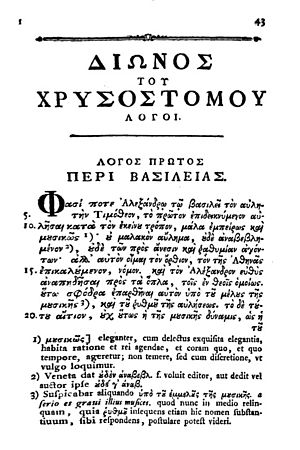Dio Chrysostom facts for kids
Dio Chrysostom (around 40 AD – around 115 AD) was a famous Greek speaker, writer, thinker, and historian. He lived during the time of the Roman Empire. People also called him Dion of Prusa or Cocceianus Dio.
Dio was known for his amazing speeches. Eighty of his speeches, called Discourses or Orations, are still around today. He also wrote some letters and a funny essay called Encomium on Hair. His nickname, Chrysostom, comes from a Greek word that means "golden-mouthed." This shows how good he was at speaking!
His Life Story
Dio was born in a place called Prusa, which is now Bursa in Turkey. This was part of the Roman province of Bithynia. His father, Pasicrates, made sure Dio got a very good education.
Dio first lived in Prusa. There, he held important jobs and wrote many speeches and essays. He also studied different ways of thinking, especially Stoic and Platonist ideas. He was particularly interested in the Stoic ideas of Musonius Rufus.
He later went to Rome when Vespasian was Emperor. By this time, Dio was married and had a child. He started to speak out against the Emperor Domitian. Because of this, Domitian sent him away from Rome, Italy, and Bithynia in 82 AD. Dio had given advice to one of the Emperor's relatives who was plotting against him.
Dio said that a wise prophecy from Delphi told him what to do next. He dressed like a poor traveler and carried only two books: Plato's Phaedo and Demosthenes's On the False Embassy. He then lived a simple life like a Cynic philosopher. He traveled to many places in the Roman Empire, including Thrace, Mysia, Scythia, and the land of the Getae, giving speeches everywhere he went.
Dio was a friend of Nerva. When Emperor Domitian was killed in 96 AD, Dio helped Nerva become the new Emperor by talking to the Roman army. Under Emperor Nerva's rule, Dio's exile ended, and he could go back home to Prusa. He even took Nerva's family name, Cocceius, as his own, becoming Cocceianus.
Dio wrote four speeches about Kingship for Nerva's successor, Emperor Trajan. It seems he knew Trajan personally. He once said, "I am perhaps as well acquainted with your character as anyone." Dio also knew other famous thinkers like Apollonius of Tyana and Euphrates of Tyre. In his later years, Dio was very respected in Prusa. He likely passed away a few years after 111 AD.
His Writings
Dio Chrysostom was part of a group of Greek thinkers called the Second Sophistic. This group was very popular in the early 100s AD. Ancient writers like Philostratus and Synesius thought Dio was one of the best Greek speakers and thinkers.
We still have eighty of his speeches today. These speeches seem to be written versions of what he taught orally. They are like essays on many topics, including politics, good behavior, and philosophy.
Some of his most famous speeches include:
- Four speeches about Kingship, which he wrote for Emperor Trajan. These talked about what makes a good ruler.
- Four speeches about the philosopher Diogenes of Sinope. These discussed the problems people face when they don't follow Nature's path.
- Essays on slavery and freedom.
- Speeches about how to become a great orator (speaker).
- Speeches about political topics, given to different towns. He would sometimes praise them and sometimes gently criticize them, always with wisdom.
- Speeches on ethics (right and wrong) and practical philosophy, which he explained in a way that was easy to understand.
- Speeches about mythical stories and impressive show-speeches.
Two of his speeches (numbers 37 and 64) are now thought to have been written by someone else, Favorinus. Besides the eighty speeches, we have parts of fifteen others, and five letters written by Dio.
Dio also wrote many other philosophical and historical works, but sadly, none of them have survived. One of these lost works was called Getica, which was about the Getae people.
See also
 In Spanish: Dion Crisóstomo para niños
In Spanish: Dion Crisóstomo para niños
 | Ernest Everett Just |
 | Mary Jackson |
 | Emmett Chappelle |
 | Marie Maynard Daly |


